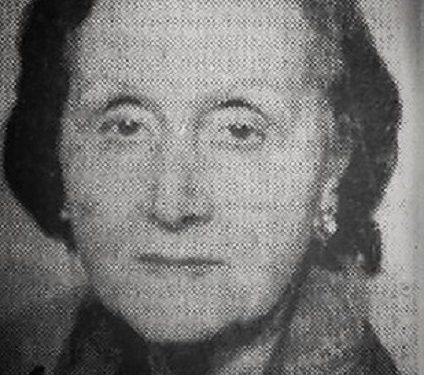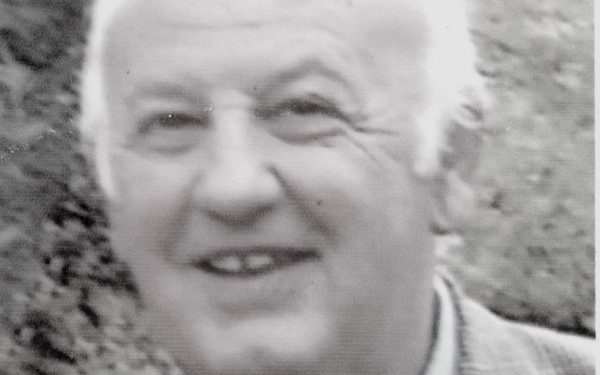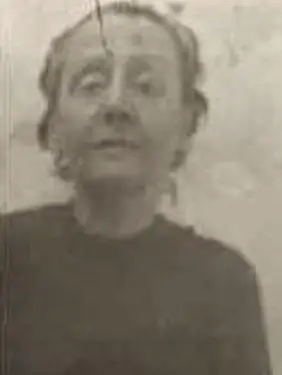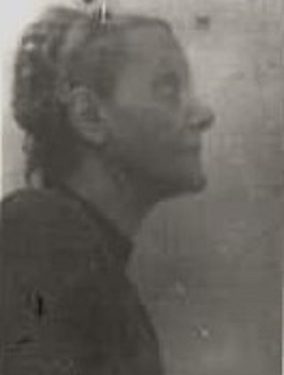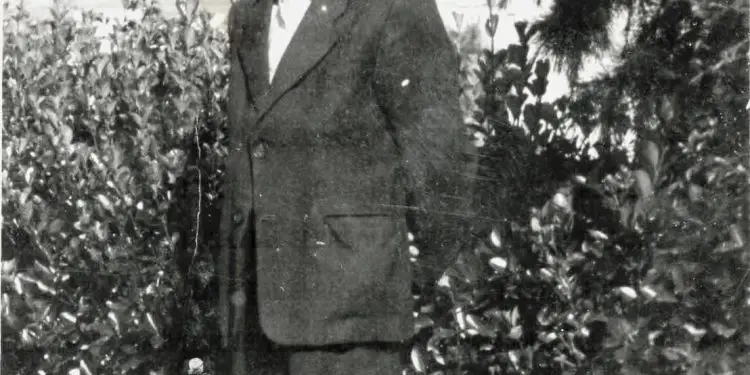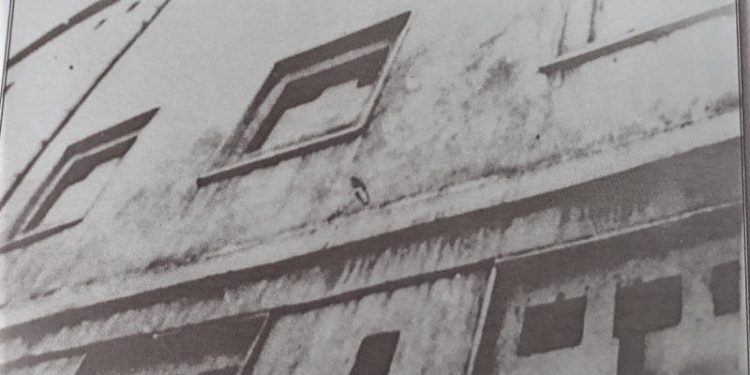By Ani Jaupaj
Memorie.al / In the previous article, we partially revealed the story of the Viennese countess, who spent 10 years of her life in Albanian prisons. After meeting Adem Balliçin, Bianka de Korvin moved to Albania, but it was not long before she was accused of being an agent of the Americans and locked up behind bars. The Psychiatric Hospital of Elbasan was another horror for her, from where she is said to have left half dead. The members of the Balliçi family, those who had lived with Bianka, told us how they remembered her. A woman like her, who came from an aristocratic life, attracted the attention of everyone in Tirana. But not only here. Her life was so curious even for the Italians. No one knew what happened to Bianka after leaving Albania. The randomness and ease of today’s mass information tools made us learn what happened to him in those years of his life that were left.
Livio Caiulo, although quite young, because of his grandparents, had quite friendly relations with the “mysterious woman”. Livio contacted us to find out what was written in the article about her that we published some time ago, which he did not understand due to the language. Through this communication, we learned that unknown part of Bianka, which no one had been able to unravel. Neither the old families of Tirana, with whom she had lived, nor the remaining family members of her husband, Adem Balliç.
Livio, how did you meet Bianka Balliç?
In fact, I learned from you that I had this last name, because I knew him as De Corvin. She was a friend of my maternal grandparents who, however, were older than her at the time; I’m talking about the 77s. They haven’t lived for a long time, not even mine, so I can’t tell you how they might have known each other. I was 16-17 years old, at the time I am referring to, so very young. However, we had a very good relationship, because she, like me, was interested in every kind of art form, from painting, music, literature. She was a lively woman and quite curious about things.
She liked to be always informed, especially regarding the political and social situation of the time. He liked Italy very much and considered Italians to be quite creative. He followed with great attention the political movements of young people through protests and demonstrations of the times. He was approachable to people, he communicated with everyone and he liked to share his thoughts, for any kind of argument. He helped others and donated as little as he could…!
Was there enough income to donate? If we refer to the time when she lived in Italy, she was old, she could not work…! What did he live on?
In fact, she said that she had very poor relatives, especially her two sisters, one living in Zagreb and the other in Argentina, to whom she sent some small financial aid. Among other things, she said that in the communist countries, there was neither coffee, nor meat, nor jeans, and that when she could, she sent her friends who lived in these countries, things they lacked. According to her, the communist regime was losing points, compared to the right that was progressing at that time, starting from Greece. In order to maintain a certain standard of living and to be with the people close to him, he sold paintings and antique objects that he had at home.
Where did he live? How?
He lived in Trieste, near “Sant Antonio” square. He said that he had once lived there with his mother, whose name was Colomba. Every time he remembered it, he cried. He lived on the second floor of a building. The outer door of the house, I remember that it was quite old, damaged, did not close completely. Inside was a dark hallway with outdated furniture and an antique Chinese lampshade that let in very little light. To the left of the entrance to the apartment, was the kitchen with some red furniture, which she had painted herself.
There were some pretty nice paintings on the walls that must have been from the 1900’s. I remember that there were some old objects, brought from Turkey. Even the furniture of the living room came from there. In the bathroom there was a marble bathtub, with lion feet. In the bedroom, there were many other paintings, some of which were painted by her. There was still a lot unfinished. In the living room, I remember there were pictures in the frames, among which, she had gone out with her husband, sisters and parents.
It was a couch with cushions embroidered by her mother and baroque furniture. What immediately caught the eye was the tall mirror with motifs from the time of Louis XV. I also think of a painting from the 1700s, a portrait of a man in a white uniform that looked a lot like him. If I’m not mistaken, there was also an old piano in the house. However, despite the objects, some of which, those that had been sold, had left empty space in the house, the house was a mess, neglected. She was aware of that.
He had no relatives, no one to help him?
It said there was a cleaning lady, but I doubt that was true. He also added that from time to time, a social worker from the municipality came to see how he was, this could be true. He often left Trieste, because he traveled a lot, but he did not tell where he was going, except on rare occasions. He went to Rome for sure. More often. There were acquaintances and friends, priests and poor aristocrats, even some on the verge of poverty.
He knew, according to what he said, many painters, writers, actors, celebrities of those times, now dead. He also frequented the lawyer’s father, with whom he died in the accident in 1985. In Trieste, she was doing well; she often went to the “Duchi d’Aoste”, “Specchi” and “Tommaseo” cafes, in the company of several other elderly women. He spent most of his time reading, writing and painting. He also told me about an English professor who often came to his house.
Has he ever talked to you about the years he spent in Albania? Although, for sure, they were her worst years, as a prisoner and accused “agent of the Americans”. Did he mention any of these?
The news about the death of Countess De Corvin, in the Italian newspapers, in 1986, after the serious accident due to the snow in Zagreb. About 7 cars collided in that accident, and there were several deaths he had some anxiety because he felt like he wouldn’t be able to do some things, which he didn’t want to talk about, he had to go, run away and come back…! I did not understand this. At this point yes, she was a mysterious but good woman. He believed in God a lot, and he told this to others.
I don’t know anything about whether or not he was a spy, or even if he was accused of it. She didn’t let anything be understood. Nothing. For the time he spent in Albania, he never said a single sentence. At least not with me, even though I met him often because I had to take care of my grandparents and I had to spend a lot of time with them. Whenever I saw him lonely and tired, I told him to call me, for any need he might have. I had left my phone number on her kitchen wall, but she refused help from anyone.
In Albania, it was said that she stayed for a long time in the Psychiatric Hospital of Elbasan, from where she came out almost dead. If that was the case, there must have been obvious consequences…?!
Most of the time, she was lucid, but of course she often forgot things, or confused them with others. He answered me in a language I did not know. But I justified this more with age, she was almost 80 years old then, and it seemed normal to me. Then, whether some of the discussions were a figment of her imagination, I don’t know. It didn’t seem unbalanced to me.
It was quite original, out of the ordinary, so different from others. Some of my friends considered it a little “crazy” or, however, strange. It was very special in the way it moved, walked, talked. An unusual woman, she seemed like a creation of fantasy. It often seemed to me as if a man who had once died had come back to earth for a brief visit.
What conversation or what memories do a 17-year-old have from the time he shares with an elderly woman?
I often went to her house, she prepared Turkish coffee for me, which she boiled three times and then returned. Every time she finished drinking her coffee, she added that at the end of the cup, you can read your future, which she used to do. Sometimes he also offered me drinks, especially a special cognac, which he preferred. She consumed a lot of dates, her favorites. He was very gentle, but also with a tough character. Once, I brought her a bunch of flowers and she turned to me angrily: “I absolutely cannot accept them! Give it to your girlfriend!
But as he said this with a frown, tears flowed down his cheeks. He observed people carefully and appreciated even the smallest details. “I fall in love with every young man I meet! This must be my west”! Repeated. On the floor above her, lived a family with many children, to whom she constantly brought candy. He would knock on the door and say: “It’s me, the countess”! This always made me laugh because she seemed so proud of it, even though she didn’t mean it so seriously. There was irony, quite subtle.
What about her previous life? The time when she was a countess…
It indicated that he came from a Hungarian-Bosnian family of emperors. Earlier still, by a Roman emperor, Flavio Corvino. He was born in Turkey. He had lived in Russia before the revolution and that, however young, he had met Tsarina Romanov. She had an English grandfather and lived in Vienna, from where she later moved to Rome to study at a nuns’ college. In this college, there were 20 countesses and 7 princesses and that the first ones, every time the princesses passed, had to lower their heads.
At home they called her Blanche (not Bianka), because in the early 1900s the French language was used. In her home, education and culture in general was the most important thing. He had relatives in Cannes and Monte Carlo, whom he used to visit. Afterwards, she married Count Giustiniani, whom she said she had loved very much, but had died. In those days, he said that he lived a rather capricious life; he was a skeptic about everything. He wanted luxury, he had several purebred dogs, and ostrich skin furs, an expensive house and car. He was showing me the ring he wore on his finger, with the coat of arms of Giustinian.
In fact, it showed different events from the family, especially about the frequent trips around Europe, even to Singapore. He had frequented casinos a lot, he liked to play roulette. He knew many foreign languages. One day, he translated into Italian a few pages of a 1760 painting treatise he had at home, written in Gothic German. There it was said that the preparation of colors was done using eggs, insects, various powders, and even the skin of iguanas.
How did you learn of her death?
In 1986, when the car accident happened, without knowing anything, I went to her house and, since I couldn’t find her, I asked the neighbors who told me that she had died in a car accident. In those moments, it occurred to me that Bianka was not afraid of death: “As thousands of people have died, I will die too.” I didn’t do anything bad, I didn’t steal, I didn’t kill anyone, I will die peacefully” – he told me one day. His stomach once hurt so much, he said to himself; “God, I’m ready, you can take me”!
What happened to all the things, the paintings that were left in the house?
Yes, there were many valuable paintings and items left, as I told you above. I contacted a person in charge of the area and they told me that they had tried to find any relatives, but they had not found any. They had been able to find an elderly relative of hers in Italy, but he had wanted nothing to do with her. He also told me that after the accident, someone had entered his house and taken some things, because he had not paid the rent for years. The remaining part was auctioned. A large part was bought by a lady who lived in another town, but I never got in touch with her.
These are my memories of Bianca, a man who, even after what you tell me, I continue to be curious about. Above all, why did he never speak about the things that happened to him? What I remember was a positive woman, who conveyed Christian values and helped others. He always recommended studies, as the only good opportunity in life, he appreciated even small things, art and enlightened minds. Money was unimportant to him, he valued it very little, and he gave this advice to others.
In the 70s, Trieste was a decadent and mysterious city, there were few jobs and many victims of big regimes, many lost fortunes, many dramas, people of all ethnicities; Slavs, Armenians, Jews, Greeks, Germans. It was a city open to the sea, silent, frontier land, it seemed like a world open to all. There were different religious beliefs. Bianca liked this turbulent atmosphere, as she herself defined it. Memorie.al




